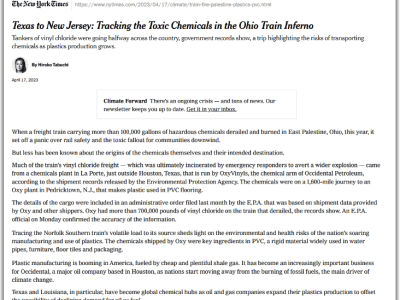When a freight train carrying more than 100,000 gallons of hazardous chemicals derailed and burned in East Palestine, Ohio, this year, it
set off a panic over rail safety and the toxic fallout for communities downwind.
But less has been known about the origins of the chemicals themselves and their intended destination.
Much of the train’s vinyl chloride freight — which was ultimately incinerated by emergency responders to avert a wider explosion — came
from a chemicals plant in La Porte, just outside Houston, Texas, that is run by OxyVinyls, the chemical arm of Occidental Petroleum,
according to the shipment records released by the Environmental Protection Agency. The chemicals were on a 1,600-mile journey to an
Oxy plant in Pedricktown, N.J., that makes plastic used in PVC flooring.
The details of the cargo were included in an administrative order filed last month by the E.P.A. that was based on shipment data provided
by Oxy and other shippers. Oxy had more than 700,000 pounds of vinyl chloride on the train that derailed, the records show. An E.P.A.
official on Monday confirmed the accuracy of the information.
Tracing the Norfolk Southern train’s volatile load to its source sheds light on the environmental and health risks of the nation’s soaring
manufacturing and use of plastics. The chemicals shipped by Oxy were key ingredients in PVC, a rigid material widely used in water
pipes, furniture, floor tiles and packaging.
Plastic manufacturing is booming in America, fueled by cheap and plentiful shale gas. It has become an increasingly important business
for Occidental, a major oil company based in Houston, as nations start moving away from the burning of fossil fuels, the main driver of
climate change.
Texas and Louisiana, in particular, have become global chemical hubs as oil and gas companies expand their plastics production to offset
the possibility of declining demand for oil as fuel.
While tiny East Palestine has drawn considerable attention for the inferno and its potential health consequences, communities nationwide
are regularly grappling with the health and safety implications of the surge in chemical manufacturing and transportation.

